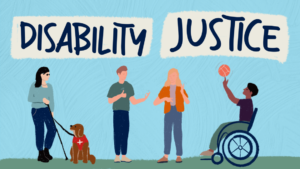Disability justice is a framework and movement that seeks to address and rectify the systemic injustices and inequalities that people with disabilities face. It is important to understand the core tenets of disability justice to support and advocate for the rights and well-being of people with disabilities. These were inspired by the Principles of Disability Justice. Read more about the 10 Principles of Disability Justice here.
Intersectionality: Disability justice recognizes that disability does not exist in isolation. It intersects with other aspects of a person’s identity, such as race, gender, sexuality, class, and more. It acknowledges that individuals with disabilities often face multiple forms of discrimination and oppression, and these intersecting identities must be considered in any analysis or advocacy.
Centering Voices of Disabled People: Disability justice emphasizes the importance of amplifying the voices and leadership of people with disabilities themselves. It prioritizes the lived experiences and perspectives of disabled individuals and encourages them to be at the forefront of decision-making processes and advocacy efforts.
Anti-Ableism: Ableism is a form of discrimination and prejudice against people with disabilities. Disability justice opposes ableism in all its forms and works to challenge and dismantle societal attitudes, practices, and policies that perpetuate discrimination, stereotypes, and marginalization of disabled individuals.
Access and Inclusion: Disability justice advocates for universal accessibility and inclusion in all aspects of society, including education, employment, healthcare, transportation, and public spaces. This includes physical accessibility as well as accommodations for various disabilities, such as sign language interpreters, captioning, braille, and assistive technologies.
Radical Love and Care: Disability justice promotes the idea of radical love and care, which means valuing and supporting individuals with disabilities unconditionally. It emphasizes building communities and relationships based on empathy, compassion, and solidarity, rather than paternalism or charity.
Challenging Capitalism: Disability justice recognizes that capitalist systems can perpetuate inequalities and exploitation, particularly for disabled individuals who may struggle to access employment or necessary resources. It calls for economic justice and alternative economic models that prioritize the well-being of all, including those with disabilities.
Coalition Building: Disability justice advocates for building coalitions and alliances with other social justice movements, recognizing the interconnectedness of various struggles for justice. This includes collaborating with movements addressing racism, sexism, LGBTQ+ rights, and more, as these issues often overlap with disability justice concerns.
Collective Liberation: Disability justice seeks not only to address the specific issues faced by disabled individuals but also to contribute to a broader vision of collective liberation. It envisions a world where all forms of oppression are dismantled, and all people can thrive regardless of their abilities or identities.
Redefining Normalcy: Disability justice challenges the idea of “normalcy” and rejects the notion that certain abilities or characteristics are superior to others. It celebrates and values diversity and difference, recognizing that there is no one “normal” way to be human.
Transformative Justice: Disability justice calls for transformative change in society rather than mere accommodation or compliance with existing norms. It encourages systemic change that leads to a more equitable, inclusive, and just world for all.
Disability justice is a holistic and intersectional approach to addressing the unique challenges and inequalities faced by people with disabilities. It calls for a radical shift in how society views and treats disability, with a focus on empowerment, inclusion, and the dismantling of oppressive systems.

